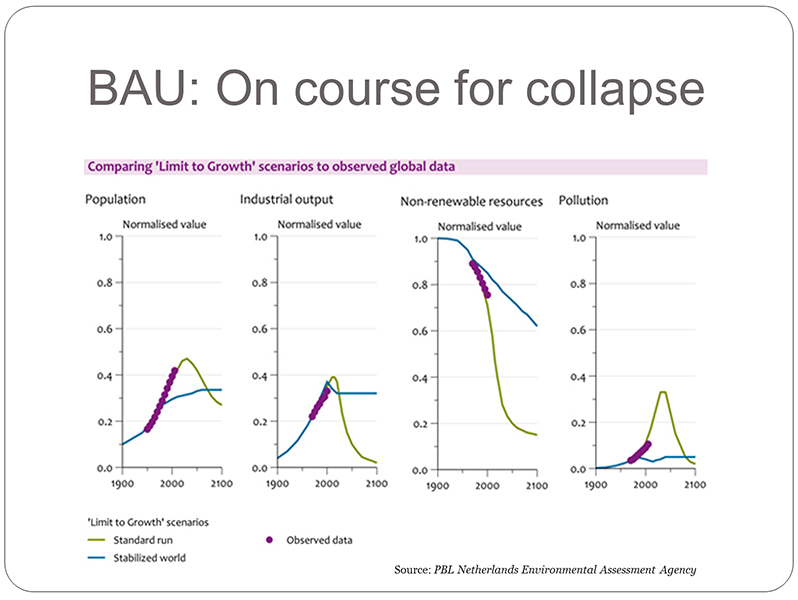 This may seem off-topic, but it’s not. I heard a talk last night by Bill Rees, who originated the concept of the ecological footprint. He presented many slides showing that we are on an unsustainable path. Of course, that isn’t news. We’ve known for a long time that we’re on that path. Bill’s slides were just a progress update—a few more data points representing a few more years since Al Gore showed us we were on that path. We have stayed right on track.
This may seem off-topic, but it’s not. I heard a talk last night by Bill Rees, who originated the concept of the ecological footprint. He presented many slides showing that we are on an unsustainable path. Of course, that isn’t news. We’ve known for a long time that we’re on that path. Bill’s slides were just a progress update—a few more data points representing a few more years since Al Gore showed us we were on that path. We have stayed right on track.
One striking slide showed the path as it was foreseen by the Club of Rome in its Limits to Growth report. The authors created a computer model showing trends on several measures including world population growth, industrial output, pollution, food production, and resource depletion. Trends were plotted assuming several scenarios reflecting different levels of intervention. The scenarios ranged from business-as-usual to sustainable. The business-as-usual trends, based on available historical data, showed a remarkably consistent pattern. The trend lines passed the planet’s carrying capacity in the 1980’s, moving into what is called “overshoot.” Overshoot is growth beyond carrying capacity—a condition which, if not corrected, leads to collapse.
Fish stocks are an example that’s easy to understand. Let’s say that the sustainable harvest of North Atlantic cod is 200,000 tons. As long as the annual catch is less than that, it can go on forever. But as soon as the catch exceeds 200,000 tons, stocks begin to decline. Of course, it is possible to go on increasing the annual catch for a few years, at a cost of depleting the stock. That is overshoot. Inevitably, a season arrives when the harvest declines. The fish population has shrunk to the point that the formerly sustainable harvest of 200,000 tons is no longer possible. The catch will continue to decline.
What’s needed then is a drastic change of policy: to close the fishery for several years until stocks have time to recover. That, of course, is hard to do. People depend on the fishery for their livelihood. Better policy would have limited the harvest to sustainable levels in the first place.
That too, it seems, is hard for human beings to do.
Limits to Growth was published in 1972. I turned 24 that year. It’s a while ago. Long enough to accumulate 40 annual data points which are now overlaid on those trend lines.
Although Limits to Growth was widely read, selling millions of copies, the Club of Rome was roundly criticized for its report. Scorned. Many experts listed countless reasons for ignoring it.
A defence of the status quo is always popular. People who think change is needed always have to fight the uphill battle.
Until change happens on its own.
The 40 years of data points? When overlaid on the various scenarios projected by the Club of Rome models, there was one they fit remarkably well. The business-as-usual scenario. It turns out we have been following the path of the Club of Rome’s 1972 business-as-usual projection, step by step, for forty years.
Despite being warned—and warned again, and again—we have continued down the same path. Like we’re sleep-walking. Like the children led by the pied piper. Like lemmings running off a cliff.
Why are we doing this? We’re not that stupid. As Rees pointed out, we have an ability to foresee and plan for the future, vastly superior to any other species. Our neocortices can marshall evidence and make amazingly accurate predictions. We do science. We got to the moon.
The end of the path we’re on, as we know, is as nasty as any to which the paths of human history have ever led our wayward species. In January this year, Australia had to add a new colour—the purple of a hideous bruise—to its temperature map, to show peaks above 52 deg C. For seven successive days, national averages topped 39 deg C., an all-time record heatwave. These reports of record-breaking weather are becoming routine. And everyone knows—don’t we?—that the Arctic sea ice shrank to the smallest area ever recorded in 2012—less than half the area it occupied in the summer of 1972. And that the Greenland and Antarctic ice sheets are melting fast, raising sea levels.
Yet as far as global warming goes, we have only reached the shoulder of the upward curve of the hockey stick. So far, average temperatures have risen just 0.6 deg C above the 20th century average. Assuming an economy that continues to rely heavily on fossil fuels, the IPCC now projects an increase of 4.0 deg C by the end of this century. Four whole degrees. Current projections for sea level rise range from 56 to 200 cm. over the same time period. Even at the low end of that range, about 10% of the earth’s population will be flooded out.
Where will 700 million flood victims relocate? Not to mention the millions of other climate refugees from places too hot to live in? Whatever the outcome, it won’t a peaceful one.
Speaking of conflict, let’s not forget the potential of fresh water shortages to turn people against one another. Not a pretty thought. Would you want to put your kids through that?
It’s not as though we had no choice. We saw this coming, and we should have acted sooner. Our governments should have acted sooner. These problems can only be addressed collectively. Yet governments—especially our senior governments—have contributed more to the problem than to solutions. I know, I’m generalizing. I am undoubtedly biased by living in a country that is among the worst public policy offenders on earth. Canada still uses tax dollars to subsidize tar sands development. Governments don’t come much worse than that.
But it’s not just Canada. The data points are eloquent. We as a species have not stepped off the unsustainable path.
Of course it is late in the day. We should have corrected our course when it first became obvious that we had a problem. Around 1972. If we had done so, we’d be getting all our energy from renewables by now—wind, hydro-electric, and photovoltaics. We’d have a green economy, and wouldn’t have to worry about our waterfront properties going underwater. Since we didn’t do that, we must face the consequences. Every so often I run into someone who thinks it’s too late. The game is over. That could be true. But I suggest that we don’t know that it’s true. Anyway, it’s an unacceptable attitude. Human beings have, in the past, proved themselves capable of rising to challenges and overcoming heavy odds. Think of the Allied response to Hitler—once they got over pretending that appeasement would work. Under resolute leadership, by marshalling all resources on a war footing, through sacrifice and rationing, by going all out, they stopped the evil that threatened them. So, perhaps, could we. So far there’s no sign of the resolute leadership, which is a pre-requisite. But it might turn up, if enough of us are prepared to vote for it.
And why wouldn’t we vote for it? Putting our shoulders to the wheel, together, in a common cause isn’t a bad thing to do. It gives you a sense of being part of something bigger than your own little life. Sacrifice can be bracing, if it’s in a worthy cause. And what cause is worthier than maintaining a habitable planet for our children and grandchildren? As Bill Rees said repeatedly last night, “Come on people, let’s get real!”
Why haven’t we already done this? The fact that we haven’t continues to shock and enrage me. I can hardly stand it. But let me try to get past the emotion and pose the question coolly: why haven’t we done it?
Human beings love theories, and don’t give them up easily. We are capable of denying or explaining away all sorts of inconvenient facts that intrude on our favourite nostrums. Even scientists don’t give up their theories easily in the face of countervailing evidence, as Thomas Kuhn detailed in The Structure of Scientific Revolutions. Non-scientists, who lack both scientific discipline and exposure to the paradigm-changing history of science, are worse. This is understandable. We all live by our theories, our general ‘knowledge’ of how the world works. They are the lenses through which we interpret our experience; we stake our lives and careers on their predictions. We no more want to abandon them up than to give up a familiar set of tools, that have performed well for us for a long time.
There is a view in neuroscience that the left brain hemisphere is the theoretician. It embraces and defends theories (and ideologies), which the right hemisphere questions. The right hemisphere plays Devil’s Advocate; its job is to notice inconvenient facts. This division of labour is especially pronounced in men. If the right hemisphere is knocked out of action, say by a stroke, the person becomes increasingly dogmatic in his opinions, far less likely to be swayed by evidence, and more likely to make ridiculous arguments in their defence. In the extreme case, this is manifested as anosognosia—denial of disability. Stroke patients who are paralyzed on the left sides of their bodies deny their paralysis. They are otherwise clear-headed and in touch with reality, but on this one point they are delusional. Such a patient says he can move his left arm, of course! When the doctor asks him to demonstrate, he responds with a feeble excuse, “I’m a bit tired today.” Or with hostility. “I don’t take orders from you, doctor!”
I think of anosognosia when I see us so sadly failing to respond appropriately to the evidence of the catastrophe we are making for ourselves. It is a blind spot: like the stroke patient, we cannot see our own paralysis. We make ridiculous excuses.
I don’t pretend to be able to explain this. Perhaps neuroscience will eventually shed enough light on the human motivational system—its levers and cogs and fuel—that we will understand our shortcoming in this regard. Our specific motivational disability. If we can understand it, I have hope we can overcome it. Of course, the big question is whether that will be soon enough.
Return to the Phantom Self home page.


Great website and interesting article, thanks. This article has been been doing the rounds http://www.alternet.org/media/most-depressing-discovery-about-brain-ever. Also depressingly the work of Daniel Kahneman “Thinking Fast and Slow” would seem to back a certain pessimism. We can know stuff but does it change us?